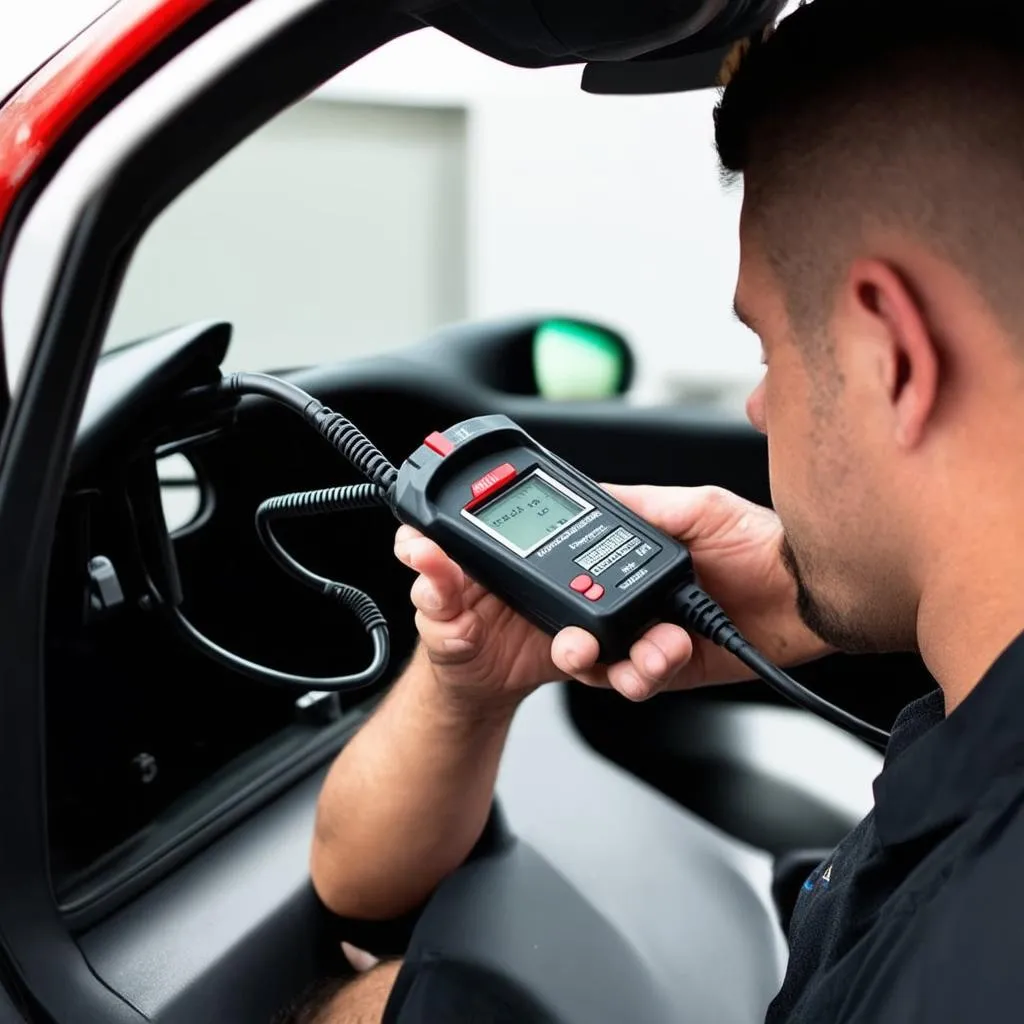Have you ever seen a cryptic code flash on your Mitsubishi’s dashboard and wondered what secrets it held? Like a whisper from your car’s soul, these mysterious codes, known as OBD codes, can seem like a foreign language. But fear not, fellow Mitsubishi owner! This guide delves deep into the world of Mitsubishi Obd Codes, empowering you to understand your car’s silent pleas and navigate the path to a healthy, happy vehicle.
Understanding the Language of Your Mitsubishi
Just as we communicate with words, our cars use OBD codes to tell us what’s going on under the hood. OBD stands for On-Board Diagnostics, and these codes are your car’s way of signaling a potential issue. Imagine this: you’re driving your trusty Mitsubishi Montero, cruising down the highway, when suddenly, a yellow light resembling a miniature engine illuminates your dashboard. This, my friend, is the dreaded “Check Engine” light, and it’s often accompanied by an OBD code.
What Does a Mitsubishi OBD Code Mean?
Each OBD code is a unique combination of letters and numbers, each sequence pointing towards a specific area within your car’s systems. For example, a code starting with “P” typically indicates a powertrain issue, while a code beginning with “B” might suggest a problem with the body electronics.
Let’s say you see the code “P0301” displayed on your OBD scanner. This specific code translates to a misfire detected in cylinder number one. Armed with this knowledge, you’re no longer in the dark. You can now investigate potential causes, such as a faulty spark plug, ignition coil, or even a fuel injector problem.
Why Are Mitsubishi OBD Codes Important?
Understanding OBD codes can save you time, money, and potential headaches down the road. By promptly addressing the issue highlighted by the code, you can prevent minor problems from escalating into major repairs. Think of it as preventative healthcare for your Mitsubishi!
“A stitch in time saves nine,” as the old adage goes, and this rings especially true when it comes to car maintenance. Just as a doctor uses symptoms to diagnose an illness, you can use OBD codes to pinpoint issues within your Mitsubishi.
 Mechanic using an OBD scanner on a Mitsubishi
Mechanic using an OBD scanner on a Mitsubishi
Decoding Common Mitsubishi OBD Codes
While countless OBD codes can pop up on your Mitsubishi, some appear more frequently than others. Familiarizing yourself with these common codes can give you a head start in diagnosing and addressing issues:
- P0420: Catalyst System Efficiency Below Threshold (Bank 1) – This often indicates a problem with the catalytic converter, a vital component in your Mitsubishi’s emissions system.
- P0171: System Too Lean (Bank 1) – This code suggests that the engine is running lean, meaning there’s too much air compared to fuel in the air-fuel mixture.
- P0300: Random/Multiple Cylinder Misfire Detected – This code indicates that one or more cylinders in your engine are experiencing misfires, which can lead to reduced performance and increased emissions.
Finding the Source of the Problem
Once you’ve identified the OBD code troubling your Mitsubishi, it’s time to play detective. Refer to a reliable Mitsubishi OBD code database or consult with a trusted mechanic. These resources can provide detailed information about the code, potential causes, and recommended diagnostic steps.
Remember, while the code itself provides a starting point, thorough inspection and diagnosis are crucial for identifying the root cause and implementing the correct solution.
 Mechanic inspecting the engine bay of a Mitsubishi
Mechanic inspecting the engine bay of a Mitsubishi
The Importance of Regular Maintenance
Just like maintaining a healthy lifestyle can prevent illnesses, regular maintenance is key to preventing many OBD code-related issues in your Mitsubishi. By adhering to your car’s recommended service schedule, you’re proactively addressing potential problems before they even arise.
Here are a few essential maintenance tasks that can help keep those pesky OBD codes at bay:
- Regular Oil Changes: Clean engine oil is the lifeblood of your Mitsubishi, ensuring smooth operation and preventing premature wear and tear.
- Spark Plug Replacement: Worn-out spark plugs can lead to misfires and reduced engine performance, so adhering to the recommended replacement intervals is crucial.
- Air Filter Inspection and Replacement: A clogged air filter restricts airflow to the engine, potentially impacting fuel economy and emissions.
- Fuel System Cleaning: Over time, deposits can accumulate in the fuel injectors and other components, affecting fuel delivery and engine performance.
Embracing the Spirit of Preventative Care
In many cultures, maintaining harmony and balance is essential for well-being. Similarly, maintaining your Mitsubishi with care and attention can prevent imbalances within its intricate systems, ensuring a smooth and enjoyable driving experience.
Regular maintenance not only helps prevent costly repairs but also promotes a deeper connection between you and your car. Just as a well-tuned instrument produces beautiful music, a well-maintained Mitsubishi will reward you with reliability and driving pleasure for years to come.
Need Help Deciphering Your Mitsubishi’s OBD Codes?
Don’t let those cryptic codes intimidate you! Our team of expert automotive technicians is here to assist you every step of the way. Contact us on Whatsapp at +84767531508 for personalized support and guidance in diagnosing and resolving your Mitsubishi’s OBD code mysteries. We offer 24/7 support, ensuring that help is always just a message away.
Want to learn more about keeping your Mitsubishi in tip-top shape? Check out these informative articles:
- Emissions On-Board Diagnostics (OBD)
- 2002 Mitsubishi Fuso OBD Location
- Mitsubishi Outlander 2003 OBD Port Location
Let us help you keep your Mitsubishi running smoothly and reliably for miles to come!
